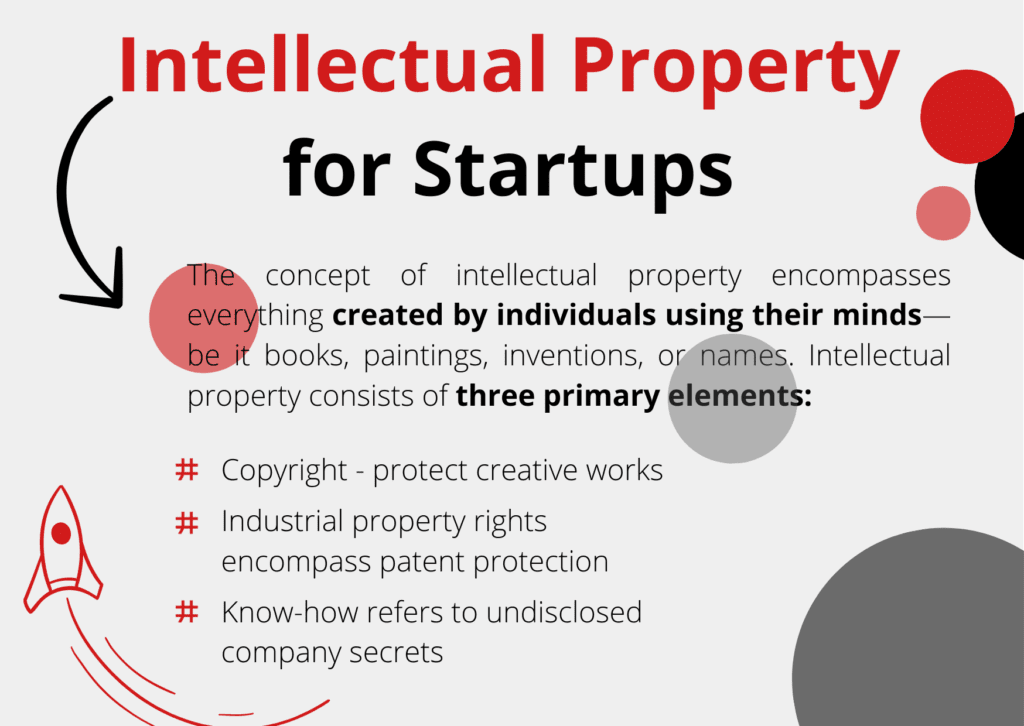Every company begins with ideas. Then, the CEOs or founders undertake everything to transform the core idea into a tangible reality—a startup. Dreams change into plans and concrete products or services. This process, transitioning from an idea to reality, is common for all companies.
Startups can operate across various sectors and be intertwined with different fields. They may leverage diverse technologies, innovations, and solutions. Hence, it is crucial to establish mechanisms for safeguarding the intellectual property utilized within such startups.
This article offers insights into intellectual property for startups and how to navigate it.
What are Intellectual Property Rights?
The concept of intellectual property encompasses everything created by individuals using their minds—be it books, paintings, inventions, or names. Intellectual property consists of three primary elements: copyright, industrial property rights, and know-how. These rights are intangible and particularly encompass copyright, trademark rights, inventions, utility models, industrial designs, Internet domains, and similar rights.

Copyright
Copyrights protect creative works. The Act on Copyright and Related Rights defines a work as any manifestation of individual creative activity, fixed in any form, irrespective of its value, purpose, or expression method. Works within a startup could include source code, photos, promotional videos, layouts, marketing descriptions, copywriting, and even blog posts. It is vital to note that copyright protection is exclusive to the author. When copyright is violated, the author can demand corrective action, such as removing infringing content.
Every startup that generates or employs creative works must ensure that the copyright for its solutions is vested in the company. This hinges on agreements between employees, co-founders, and other contributors who shape part or all of the solutions and works. Securing proper ownership of proprietary copyrights is imperative to facilitate sharing and progression. Subsequently, it is essential to grant suitable access to these solutions to clients or contractors while retaining control over their future utilization and modification rights.
Industrial Property Rights
Industrial Property Rights encompass patent protection for inventions, trademarks, industrial designs, utility models, geographical indications, including utility models and integrated circuit topographies. In the context of startups, utility models hold particular interest. These entail novel, useful technical solutions related to the form, structure, or combination of a durable object. Unlike copyright protection, industrial property protection requires additional steps.
Know-how
Know-how refers to undisclosed company secrets—confidential technical, technological, organizational, and economically valuable information that confers a competitive edge. To safeguard this information, companies must establish appropriate agreements with employees and contractors. These often include confidentiality agreements and non-compete clauses. It’s crucial to recognize that no single template fits all such contracts; their form hinges on business nature and the information is considered a trade secret.
Is NDA Worth It?
The Non-Disclosure Agreement (NDA) ranks among the most prevalent agreements struck by startups. NDAs are employed in relationships between startups and investors, potential investors, business partners, clients, and employees.
The primary goal of an NDA is safeguarding unique ideas. This holds special significance in startups where ideas are paramount, and premature disclosure can lead to failure. NDAs serve to protect startups and their ideas. Frequently, these agreements are signed with employees, preventing them from discussing or revealing projects they’re involved in.
In NDAs, startups stipulate the information requiring protection. The coverage can be broad or focus solely on key matters. Additionally, NDAs address how confidential information must be labelled by the contract parties. This avoids ambiguity about whether information falls under NDA protection.
Intellectual Property plays a pivotal role in startups’ prosperity. Therefore, if you wish for your startup to flourish smoothly and without hindrances, attending to these aspects is paramount.
For any inquiries regarding startups or outsourcing, feel free to reach out to us. For further information, explore our blog and Instagram!
